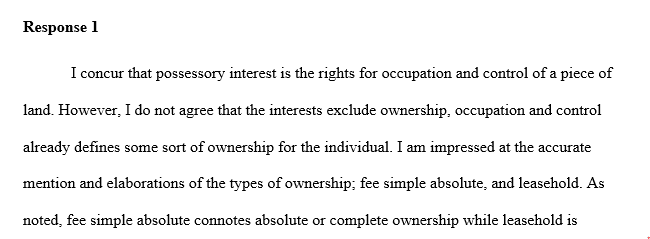Possessory interest
Response 1:
A possessory interest is a right for a person to occupy or control a plot of land, but not have ownership. A person or persons have a lease or rental agreement to live on the premises or a building temporarily for use, for the specified period of the agreement. Ownership interest as it relates to the legal system in real property. Ownership viewed fee simple is a person that possesses the bundle of rights and is held in the most complete form of a person who has a possessory interest. Simple fee possesses rights, privileges, and the most power, and if wanting to dispose of the property, it can be done using instruments such as a deed or will. Therefore, if no deed exists, ownership will go directly to the individual’s heirs upon death. The fee simple right to use of land, however, the owner wants, as long as, any applicable limitations (zoning, environmental laws, etc.) are considered. If there is a use that is unreasonable, the owner could be liable for the tort of nuisance. For instance, if the next-door neighbor is in a Band and its members come over and practice every night for long lengths of time so much that it interferes with the neighbor to the point of no sleep, due to the level of noise. After asking the neighbor not to practice so long so that they can sleep to no avail, they sued the neighbor for interfering with the enjoyment of their property. Another possessory interest is life or leasehold estate that is created by conveyance and lasts for the duration of a specific person, as long as it does not have a negative effect to the land that diminishes its value. They are responsible for repairs, maintenance and paying property taxes, possessing the same rights as the fee simple, with the exception of, the life estate tenant must maintain the value during the duration of the tenancy. Non-Possessory interest is an interest in land that excludes a right to possess the property such as an easement, profits, and licenses. Take for example, that I have a garden of flowers that I allow someone to remove from my property to make a profit.
Reference
Miller, R.L., & Jentz, G.A. (2016). Fundamentals of Business Law today: Summarized Cases (10th Ed.). Mason, OH: Thomson-West Publishing. ISBN: 9781305075443
Response 2:
Deeds show possession and title to land that individuals use to pass land from person to person. A valid deed should have the names of the buyer or seller also called, grantee and grantor. Must include words that signify intent, “I hereby grant,” etc., with a description of the land, and the grantor’s signature and delivery of the deed. Deeds used to pass possession and title to land from person to person are: (1) Warranty, (2) Special Warranty, (3) Quitclaim. Each deed has its own protection, for defects of a title.
The Warranty deed is the most popular of the deeds because it provides the greatest agreement. The agreement grants the title, and power to convey property, non-disturbance stipulation while in possession of the land, and a transfer of property without knowledge of adverse claims of a third party. The Special Warranty also called limited warranty deed, meaning there is not guarantee that there are no defects from the prior owner. The deed discloses all liens or other burdens, the seller will not be liable to the buyer if a third person interferes. But, in that case, the seller will be liable to the buyer for damages. A Quit claim deed offer less protection than the other deeds and is used when the seller don’t really know the extent of their rights to the property. It is often used to settle divorce to release one party’s interest in a property.
The recording statutes give notice to the public of the new owner’s interest in land and prevents the previous owner from fraudulently duplicating the same for a fee. Therefore, the grantor is obligated to transfer title of insurance, which is a method of insuring a good title and that is free of defects.
Reference
Miller, R.L., & Jentz, G.A. (2016). Fundamentals of Business Law today: Summarized Cases (10th Ed.). Mason, OH: Thomson-West Publishing. ISBN: 9781305075443
Answer preview to possessory interest
APA
264 words
Get instant access to the full solution from yourhomeworksolutions by clicking the purchase button below



